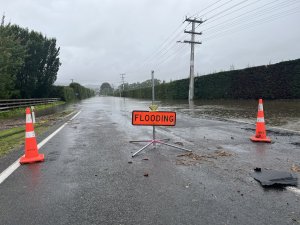Respiratory physician Lutz Beckert considers chronic obstructive pulmonary disease management, including the prevention of COPD, the importance of smoking cessation and pulmonary rehabilitation, and the lifesaving potential of addressing treatable traits. He also discusses the logic of inhaler therapy, moving from single therapy to dual and triple therapy when indicated, as well as other aspects of management
A crucial Budget for primary care: Cyclone recovery a priority but unlikely to be at health’s expense
A crucial Budget for primary care: Cyclone recovery a priority but unlikely to be at health’s expense

This is an early online publication of a story due to appear in the 1 March print issue
I would eat my hat if there wasn’t a substantial decision made about primary healthcare funding
A public policy expert says she is looking to the Budget in May for major action on primary care funding.
“The current health reforms will not succeed without significant breakthroughs in how primary care is funded,” says Verna Smith, senior lecturer in public policy at Victoria University of Wellington.
“[The] social investment case is so outstandingly clear to me,” says Dr Smith, “that we need to invest now, to get ahead of all of the challenges of (a) the inequity of outcomes but (b) the ageing population and the burden of caring for that, not only in terms of health and wellbeing but just in terms of longevity.”
She adds: “I would eat my hat if there wasn’t a fairly substantial decision made about primary healthcare funding.”
Dr Smith says Labour has the opportunity to “really put a marker in the sand for what it is expecting from the reforms”.
Prime minister Chris Hipkins and finance minister Grant Robertson were forced to go back to the drawing board with their Budget plans in the wake of last month’s cyclone devastation, with big questions around what they will announce on 18 May in terms of recovery and how they will pay for it.
Infometrics principal economist Brad Olsen says the Government knows it needs to invest more in healthcare, with the COVID-19 pandemic putting the state of the sector at the forefront of voters’ minds.
"I can't see them touching the healthcare budget to try to fund the [cyclone] recovery,” Mr Olsen tells New Zealand Doctor Rata Aotearoa. “I definitely can’t see them cutting it, that would be bizarre at a time when cost pressures are as high as they are.
“I think there’s also a real need to maintain funding levels at the same level they are now in real terms, so accounting for that inflationary effect.”
The Government has “a lot of borrowing room”, if needed, to access more funding for the cyclone recovery, he says, and that’s the most likely route it will take.
However, larger projects are “probably off the table” this year.
Mr Olsen says: “There’s been a lot of conversations recently around GP funding and what happens on the primary [care] side of things, so that seems to be an area that could see greater investment.”
University of Otago health policy professor Robin Gauld says the Government will have to “dig deep” to fund the cyclone recovery and also meet its other obligations.
The $300 million immediate funding package announced on 20 February was non-earmarked expenditure, outside the Budget, Professor Gauld says.
He says more funding will likely be announced and the question is whether it will be taken from other areas and then reallocated to a new cyclone relief fund, “or whether they just add it in to the Budget”.
“But,” he continues, “if any money comes [out of] healthcare, I think it’s going to be a bad move.”
Professor Gauld adds: “We might actually see more money going into primary care, and into general practice and then we might see, alongside that, money going into the localities.”
We're publishing this article as a FREE READ so it is FREE to read and EASY to share more widely. Please support us and the hard work of our journalists by clicking here and subscribing to our publication and website



![Brookfields Bridge fails [Facebook, Cathleen Adams]](/sites/default/files/styles/cropped_image_4_3/public/2023-02/Brookfields%20Bridge%20fails.png?itok=BntlpBRG)



![Barbara Fountain, editor of New Zealand Doctor Rata Aotearoa, and Paul Hutchison, GP and senior medical clinician at Tāmaki Health [Image: Simon Maude]](/sites/default/files/styles/thumbnail_cropped_100/public/2025-03/Barbara%20Fountain%2C%20editor%20of%20New%20Zealand%20Doctor%20Rata%20Aotearoa%2C%20and%20Paul%20Hutchison%2C%20GP%20and%20senior%20medical%20clinician%20at%20T%C4%81maki%20Health%20CR%20Simon%20Maude.jpg?itok=-HbQ1EYA)
![Lori Peters, NP and advanced health improvement practitioner at Mahitahi Hauora, and Jasper Nacilla, NP at The Terrace Medical Centre in Wellington [Image: Simon Maude]](/sites/default/files/styles/thumbnail_cropped_100/public/2025-03/2.%20Lori%20Peters%2C%20NP%20and%20advanced%20HIP%20at%20Mahitahi%20Hauora%2C%20and%20Jasper%20Nacilla%2C%20NP%20at%20The%20Terrace%20Medical%20Centre%20in%20Wellington%20CR%20Simon%20Maude.jpg?itok=sUfbsSF1)
![Ministry of Social Development health and disability coordinator Liz Williams, regional health advisors Mary Mojel and Larah Takarangi, and health and disability coordinators Rebecca Staunton and Myint Than Htut [Image: Simon Maude]](/sites/default/files/styles/thumbnail_cropped_100/public/2025-03/3.%20Ministry%20of%20Social%20Development%27s%20Liz%20Williams%2C%20Mary%20Mojel%2C%20Larah%20Takarangi%2C%20Rebecca%20Staunton%20and%20Myint%20Than%20Htut%20CR%20Simon%20Maude.jpg?itok=9ceOujzC)
![Locum GP Helen Fisher, with Te Kuiti Medical Centre NP Bridget Woodney [Image: Simon Maude]](/sites/default/files/styles/thumbnail_cropped_100/public/2025-03/4.%20Locum%20GP%20Helen%20Fisher%2C%20with%20Te%20Kuiti%20Medical%20Centre%20NP%20Bridget%20Woodney%20CR%20Simon%20Maude.jpg?itok=TJeODetm)
![Ruby Faulkner, GPEP2, with David Small, GPEP3 from The Doctors Greenmeadows in Napier [Image: Simon Maude]](/sites/default/files/styles/thumbnail_cropped_100/public/2025-03/5.%20Ruby%20Faulkner%2C%20GPEP2%2C%20with%20David%20Small%2C%20GPEP3%20from%20The%20Doctors%20Greenmeadows%20in%20Napier%20CR%20Simon%20Maude.jpg?itok=B0u4wsIs)
![Rochelle Langton and Libby Thomas, marketing advisors at the Medical Protection Society [Image: Simon Maude]](/sites/default/files/styles/thumbnail_cropped_100/public/2025-03/6.%20Rochelle%20Langton%20and%20Libby%20Thomas%2C%20marketing%20advisors%20at%20the%20Medical%20Protection%20Society%20CR%20Simon%20Maude.jpg?itok=r52_Cf74)
![Specialist GP Lucy Gibberd, medical advisor at MPS, and Zara Bolam, urgent-care specialist at The Nest Health Centre in Inglewood [Image: Simon Maude]](/sites/default/files/styles/thumbnail_cropped_100/public/2025-03/7.%20Specialist%20GP%20Lucy%20Gibberd%2C%20medical%20advisor%20at%20MPS%2C%20and%20Zara%20Bolam%2C%20urgent-care%20specialist%20at%20The%20Nest%20Health%20Centre%20in%20Inglewood%20CR%20Simon%20Maude.jpg?itok=z8eVoBU3)
![Olivia Blackmore and Trudee Sharp, NPs at Gore Health Centre, and Gaylene Hastie, NP at Queenstown Medical Centre [Image: Simon Maude]](/sites/default/files/styles/thumbnail_cropped_100/public/2025-03/8.%20Olivia%20Blackmore%20and%20Trudee%20Sharp%2C%20NPs%20at%20Gore%20Health%20Centre%2C%20and%20Gaylene%20Hastie%2C%20NP%20at%20Queenstown%20Medical%20Centre%20CR%20Simon%20Maude.jpg?itok=Z6u9d0XH)
![Mary Toloa, specialist GP at Porirua and Union Community Health Service in Wellington, Mara Coler, clinical pharmacist at Tū Ora Compass Health, and Bhavna Mistry, specialist GP at Porirua and Union Community Health Service [Image: Simon Maude]](/sites/default/files/styles/thumbnail_cropped_100/public/2025-03/9.%20Mary%20Toloa%2C%20Porirua%20and%20Union%20Community%20Health%20Service%20in%20Wellington%2C%20Mara%20Coler%2C%20T%C5%AB%20Ora%20Compass%20Health%2C%20and%20Bhavna%20Mistry%2C%20PUCHS%20CR%20Simon%20Maude.jpg?itok=kpChr0cc)